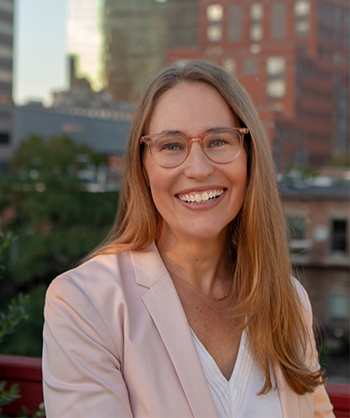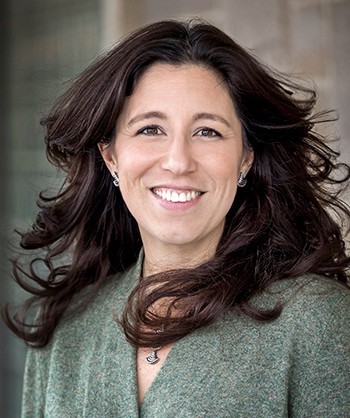What does it take to improve math outcomes for students, from early childhood to higher education? According to Lynch School professors Elida Laski and Angela Boatman, the answer lies in combining precise interventions in early childhood with systemic reforms at the college level.
In the final Faculty Research Showcase of the semester, Laski and Boatman presented their research on math education at two key developmental points: early childhood and the transition to college. Despite their different focal areas, both researchers emphasized the need for targeted interventions, cross-sector collaboration, and a deeper understanding of how students learn math—not just pass a course.
Research Highlights

Angela Boatman: The College Math Barrier
Angela Boatman, associate professor in the Educational Leadership and Higher Education Department, began by outlining the stark realities of math preparedness at the college level. Drawing on 2024 National Assessment of Educational Progress (NAEP) data, she shared that only around a quarter of high school seniors score at or above “proficient” in math—a troubling benchmark given that most college programs require at least one math course.
To address gaps in math readiness, many colleges have traditionally required students to complete one or more non-credit-bearing remedial math courses before enrolling in college-level math. But Boatman’s research shows that this model rarely leads to long-term success.
About Angela Boatman
Visit Angela Boatman's faculty profile to learn more about her research and work at the Lynch School.
“It could take two years before you pass your college-level math course,” she said. And because these classes don’t count toward a degree, they often add time, cost, and frustration, leading many students to drop out before they reach the finish line.
Boatman’s policy evaluations in Tennessee and Chile point to a better alternative: co-requisite remediation. This approach places students directly into college-level math while offering just-in-time supplementary support. Her studies show that students in co-requisite models earn better grades, persist at higher rates, and are more likely to complete their degrees, particularly in technical college settings.
Still, she cautioned that structural reform alone isn’t enough. “We are mostly just looking at grades and persistence. We aren’t actually looking at if students learned math,” she said. The field, therefore, must continue developing ways to measure actual learning, and not just academic survival.
“Math is a gatekeeper. It stands between students and their degree, their career, and in many cases, their confidence.”

Elida Laski: The Early Math Foundations
That question of “actual learning” lies at the heart of Elida Laski’s work. An associate professor in the Counseling, Developmental, and Educational Psychology Department, Laski studies how young children acquire math skills, and how those early gains influence long-term achievement.
Her research shows that math disparities in high school and college often trace back to preschool. “Pre-K math differences predict math achievement at least through the age of 15,” she explained.
“We can move the needle in these early grades—and it can have a positive effect later on.”
Using small-scale experimental studies, Laski designs and tests math interventions. One study, for example, monitored how children played a board game to encourage deeper encoding of numerical information. By encouraging a “count-on” method, rather than starting from one each time, children’s number sense significantly improved.
About Elida Laski
Visit Elida Laski's faculty profile to learn more about his research and work at the Lynch School.
She’s now extending that research into the home. “We’ve designed math games that have these spatial cues,” she said, and will assess whether they influence how families discuss numbers, quantities, and relationships.
Across these studies, one thing is clear: targeted interventions that align with children’s natural learning mechanisms, like comparison, spatial reasoning, and pattern recognition, can yield immediate, measurable improvements in numerical skills. But like Boatman, Laski questioned what those improvements mean long term. “We often assume that early gains will lead to broader achievement,” she said. “But we don’t always measure that. That’s where longitudinal studies become critical.”
Math Learning vs. Math Achievement: A Shared Challenge
While their research methods differ, Laski and Boatman found themselves grappling with the same big questions: What does it mean to truly learn math? And how do we measure that learning across time?
“A question that Angela made me think more about was: does improvement on specific foundational skills actually lead to this broader math achievement that I’m assuming?” wondered Laski. Conversely, Boatman reflected on her own use of grades and long-term persistence as proxies for learning. “Does passing a math course demonstrate actual math learning and math knowledge?” she asked.
Their conversation also raised questions about measurement timelines. Laski typically measures learning gains immediately after intervention, while Boatman often looks years down the line. Both acknowledged the need for more integrated, longitudinal designs to better understand how short-term progress connects to long-term success.
“There’s still a lot we don’t know in this area... but these conversations help us ask the right questions, and push our research, and the field, forward.”
Watch the full Faculty Research Showcase on YouTube to learn more about Professors Laski and Boatman’s groundbreaking work, and how the Lynch School is advancing equity and evidence-based change in education, one math solution at a time.


